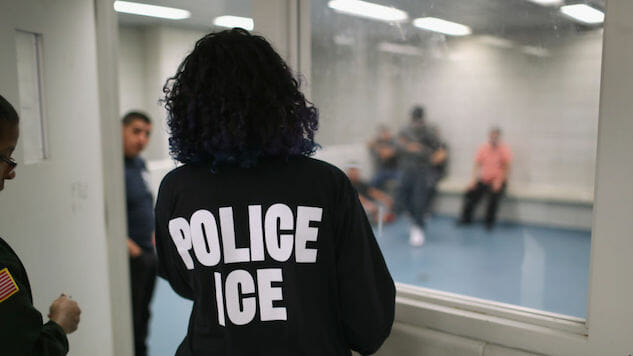ICE Detainee Diagnosed with Schizophrenia Committed Suicide After 21 Days in Solitary Confinement
Photo by John Moore/Getty
Forty-year-old ICE detainee Efraín Romero de la Rosa, who suffered from schizophrenia, committed suicide after being placed in solitary confinement for 21 days in a Georgia detention center, reports The Intercept.
Before Efraín Romero was detained at the Stewart Detention Center in Lumpkin, Ga. he traveled from Puebla, Mexico and was living in North Carolina with his brother Isaí Romero de la Rosa. In June of 2017, doctors at the Virginia Department of Corrections diagnosed Efraín Romero with schizophrenia and bipolar disorder. He was prescribed five different medications and Vitamin D. In March, Efraín Romero was arrested for larceny and taken into ICE custody to await deportation where his parents would be waiting on him in Puebla. Following 21 days in solitary confinement at the Stewart Detention Center, he committed suicide.
Isaí Romero said, “when they gave me the news, all of a sudden, the entire world collapsed. I spent the entire day crying. I didn’t know how to tell my parents what had happened. I waited for my mom to eat — to be calm, you know?”
The reason Efraín Romero was placed in solitary confinement at the Stewart Detention Center still remains unclear. Isaí Romero said, “he went to other [detention facilities] and he didn’t even scratch himself. But he goes to this facility and he takes his own life. I can’t believe it. I can’t believe what happened there.”
Efraín Romero’s death is the third death at the Stewart Detention Center since May of 2017. Jean Jimenez-Joseph also committed suicide at the facility in May 2017. He reportedly displayed suicidal behavior but did not receive mental health care at the facility. A staffer was assigned to check on Jimenez-Joseph in his cell every thirty minutes but did not do so. Jimenez-Joseph killed himself after 19 days in solitary confinement. Then, in January of 2018, 33-year-old detainee Yulio Castro Garrido died after being diagnosed with pneumonia. Garrido did not receive proper care until he was transferred to a Mayo Clinic in Jacksonville, Fla., but by then it was too late.
Lawyers and advocates have been fighting against the unhealthy and often inhumane conditions at the facility for some time. An attorney with Atlanta-based social justice group Project South, Azadeh Shahshahani, said, “We very much have a pattern here. I’m not sure what else it would take for the government to shut this place down. How can they defend what is happening at this facility?” The United Nations has even stated that solitary confinement can constitute torture.
ICE has specific instructions when it comes to isolating detainees, especially those with mental health conditions. However, the Stewart Detention Center is overwhelmed, understaffed and overall mismanaged. The facility is owned by ICE but managed by a private detention corporation called CoreCivic. There have been reports of the facility’s mail room being so disorganized and understaffed that important documents are lost. For example, an ICE supervisor reported that the chaos in the mail room caused a “delay in receiving some of the consular documents.” This delay resulted in one Mexican detainee stuck at the facility for 87 days before deportation, despite the fact that he was considered “easy to remove.” This begs the question: What happens when medical and mental health records are “delayed?”
In May of 2017 Project South released an extensive report on the conditions in two of Georgia’s largest immigration detention centers, including Stewart. The report reveals the medical care, or rather lack of medical care, that detainees receive at Stewart. The report states that “the medical unit is desperately understaffed, and sometimes detained immigrants are sent long distances for off-site medical treatment.” At the time of the report, the facility did not have any medical staff members who spoke Spanish and the staff was attempting to use a phone translation service to speak to non-English speaking detainees.
Every detainee reportedly receives a physical exam within 14 days of arrival but some detainees reported having medical conditions that were not “adequately addressed.” As for mental healthcare, most of the detainees reported they do not have access to a mental health doctor. The mental health staff only helps detainees that are “suicide risks,” and their solution is placing them in “segregation,” otherwise known as solitary confinement. A male detainee from Somalia said, “No; there is no mental health service. There is no therapy. They only put people in segregation when someone is ‘mentally ill.’”
In December 2017 the DHS office of Inspector General released a report after federal investigators examined the conditions at immigrant detention centers across the nation. The report stated that investigators found “problems that undermine the protection of detainees’ rights, their humane treatment, and the provision of a safe and healthy environment.” Specifically, at the Stewart Detention Center DHS reported the facility violated standards when it comes to using “segregation.” The report said detainees weren’t always told why they were being placed in solitary confinement. Often times, the detainees were placed in solitary confinement for “for violations of minor rules” such as refusing to preform voluntary labor.
Efraín Romero’s death has only further increased and justified the recent criticisms of the Stewart Detention Center. Immigration attorney Andrew Free, who is currently representing Efraín Romero’s parents along with the family of Jimenez-Joseph, said, “just because you’re locked up doesn’t mean you should get substandard medical care. And the standard of care is to understand what treatment has been provided in the past and what treatment is necessary — and that requires getting the records.”
ICE has not answered questions concerning Efraín Romero’s mental health or if they received his mental health records from the Virginia Department of Corrections. CoreCivic referred all questions regarding medical and mental health services to ICE. The Georgia Bureau of Investigation has also started an investigation into Efraín Romero’s death.
Including Efraín Romero, eight detainees have died in ICE custody so far this year. The DHS office of Inspector General predicts improvements will be “complete by the end of 2018” per their findings in their 2017 report. However, those improvements will not help the families of Jimenez-Joseph, Garrido or Efraín Romero. Isaí Romero has started a GoFundMe campaign to raise $10,000 in order to send his brother’s body back to Puebla so their family can say goodbye.







































